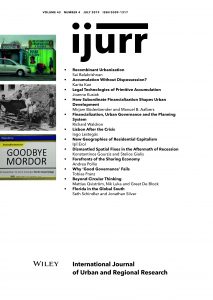Among the ‘extra‐economic means’ that facilitate primitive accumulation, or accumulation by dispossession, the law plays a prominent role. But works on neoliberal urban restructuring rarely engage with concrete legal technologies. Analysing judicial property restitution (‘reprivatization’) in Warsaw, this article grasps the machine of accumulation by dispossession at a moment of faltering and exposes the distinctive legal technologies behind its troubleshooting. It makes three contributions to critical urban studies. First, it demonstrates how judicial systems can steal political conflicts that obstruct the cycle of accumulation by dispossession. It thus introduces the notion of ‘judicial robbery’, a non‐legislated expropriation of common property through judicial engineering that simultaneously deprives the public of political agency. Second, it shows that seemingly neutral legal technicalities, usually sheltered from political debate, can become a key locus of urban politics. Third, it examines the agency, scope and spatial patterns of ‘dispossession by restitution’, the term I use for a locally specific form of accumulation by dispossession in Warsaw. Lastly, I raise the question of political struggle against primitive accumulation. Is the judicial robbery reversible? If we can reclaim property, can we also reclaim political conflicts that have been stolen by the law?

